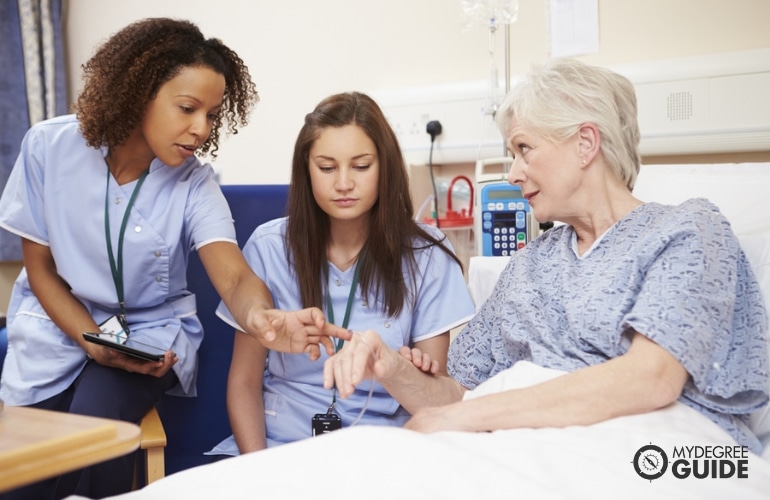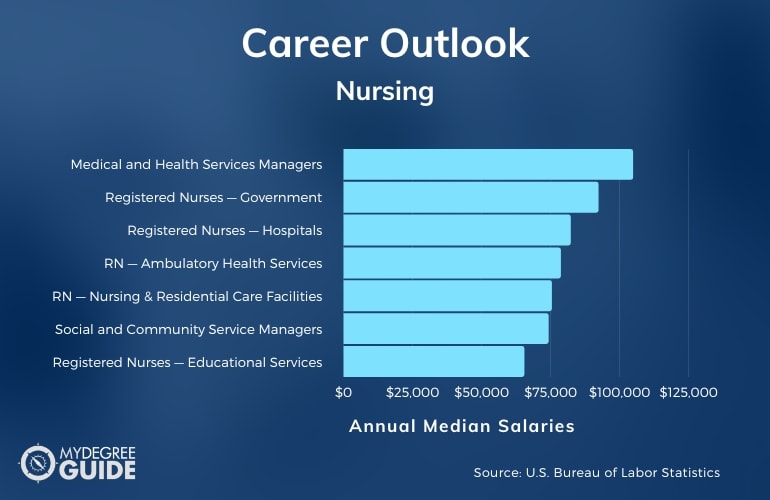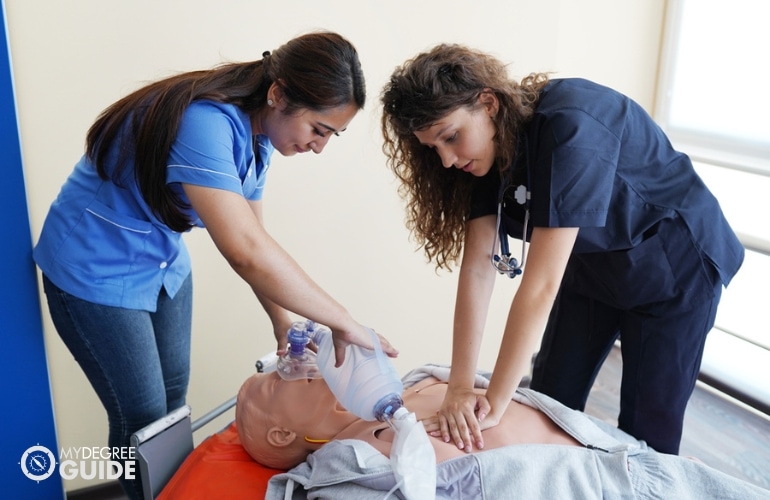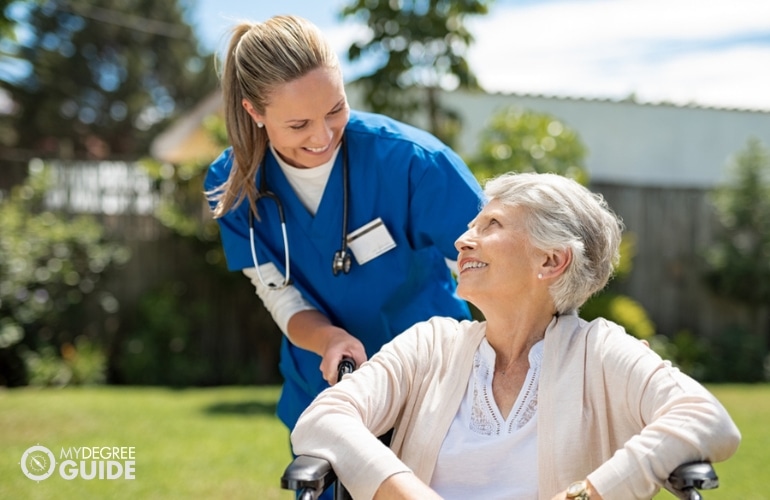Accelerated BSN programs for non nurses are intensive 1 to 2 year programs that help prepare students for careers in the nursing field.

These programs are designed for students who have completed a college degree in disciplines other than nursing. Professionals often enroll in accelerated BSN programs to transition careers and become registered nurses (RNs).
Editorial Listing ShortCode:
Fast track BSN programs for non nurses can provide efficient pathways to learning about and entering the healthcare field.
Universities Offering Online Accelerated BSN Degree Programs for Non Nurses
Methodology: The following school list is in alphabetical order. To be included, a college or university must be regionally accredited and offer degree programs online or in a hybrid format.
Averett University
Averett University offers an accelerated BSN program designed for students who hold a bachelor’s degree in another field or have at least 60 credits in nursing. Coursework is completed online, and labs are completed on campus. Three start dates are offered each year. The program can potentially be completed in 16 months.
Averett University is accredited by the Southern Association of Colleges and Schools Commission on Colleges.
Baylor University
Texas residents may earn a BSN through Baylor University’s Fast-Track program. Coursework can be completed online, but two on-campus visits are required to complete field clinicals. Applicants must have a bachelor’s degree in a non-nursing discipline before entering the program. The program requires the completion of 62 credits and can typically be finished in 1 year.
Baylor University is accredited by the Southern Association of Colleges and Schools Commission on Colleges.
Concordia University – Wisconsin
Concordia University – Wisconsin offers an accelerated BSN program designed for students who already have a bachelor’s degree in another field. The program is in a hybrid format, with some coursework online and other courses and labs on campus. Students travel through the program with a cohort. Courses follow a semester schedule. The program can typically be completed in 15 months.
Concordia University – Wisconsin is accredited by the Higher Learning Commission.
Elmhurst University
Elmhurst University offers an accelerated BSN program designed for students who have a bachelor’s degree in a different field. Coursework is online, but one or two on-campus residencies and clinical placements are required. Clinical placements may be completed locally. The program can typically be completed in under 2 years.
Elmhurst University is accredited by the Higher Learning Commission.
Grand Canyon University
Grand Canyon University offers an accelerated BSN program designed for students who have already completed undergraduate work in another field. The program is completed in a hybrid format, with online coursework and on-campus labs, simulations, and exams. The program can potentially be completed in 16 months.
GCU is accredited by the Higher Learning Commission.
Holy Family University
Holy Family University’s accelerated BSN program is designed for students seeking a second degree. The program is mostly online, with only one campus residency required. It requires the completion of 59 credit hours and 504 clinical hours. Courses are in synchronous and asynchronous learning formats. The program can potentially be completed in 14 months.
Holy Family University is accredited by the Middle States Commission on Higher Education.
Marian University
Marian University offers an accelerated BSN program designed for students who already have a bachelor’s degree in another field. Prerequisite courses must be completed through Marian’s adult learning program. The program can potentially be completed in 16 months. There are three start dates offered each year.
Marian University is accredited by the Higher Learning Commission.
Marymount University
Marymount University offers an accelerated BSN for students who already hold a bachelor’s degree in another field. Coursework is online, but one on-campus residency is required and clinicals must be completed in Virginia. The program requires full-time attendance and can typically be completed in 16 months.
Marymount University is accredited by the Southern Association of Colleges and Schools Commission on Colleges.
North Dakota State University
North Dakota State University offers an accelerated BSN program designed for students who already have a bachelor’s or graduate degree in another field. The program is completed in a blended format, with a mix of online and on-campus classes. Clinicals and labs are in-person. The program’s requirements can potentially be completed in 14 months.
NDSU is accredited by the Higher Learning Commission.
Regis College
Regis College offers a BS in Nursing designed for students who already have a bachelor’s degree in a non-nursing field. Coursework is online, but labs and clinicals are completed on campus in Boston. Courses are 12 weeks long, and the program may be completed in 24 months of part-time attendance.
Regis College is accredited by the New England Commission of Higher Education.
Rockhurst University
Rockhurst University offers a hybrid, accelerated BSN program designed for students who already have a bachelor’s degree in another field. Coursework is online, but a 10 day residency is required on campus. The program can potentially be completed in 16 months. Courses follow a semester schedule, and there are three start dates offered each year.
Rockhurst University is accredited by the Higher Learning Commission.
Roseman University of Health Sciences
Roseman University of Health Sciences offers an accelerated BSN designed for students with at least 54 qualifying credits. Students are not required to hold a bachelor’s degree. The program is taken in a hybrid format, with online coursework and on-campus labs. It can potentially be finished in less than 18 months.
Roseman University of Health Sciences is accredited by the Northwest Commission on Colleges and Universities.
Saint Joseph’s College of Maine
Saint Joseph’s College of Maine offers a hybrid, accelerated BSN program designed for students who already have a bachelor’s degree in another field. Coursework is online with synchronous and asynchronous components, but clinical hours and two on-campus residencies are required. The program can typically be completed in 15 months.
Saint Joseph’s College is accredited by the New England Commission on Higher Education, Inc.
University of Indianapolis
The University of Indianapolis was named a nursing college of distinction. The school offers an accelerated BSN program for students who already have a bachelor’s in another field. All coursework is online, but clinical hours and two on-campus residencies are required. The program can potentially be completed in 15 months.
The University of Indianapolis is accredited by the Higher Learning Commission.
University of Massachusetts – Boston
The University of Massachusetts – Boston offers an accelerated, hybrid BSN program for students who already have 68 qualifying credits from a previous bachelor’s degree program. The program can potentially be completed in 1 year of full-time attendance. Courses start in the fall, spring, and summer.
UMass Boston is accredited by the New England Commission of Higher Education.
University of the Incarnate Word
The University of the Incarnate Word offers an accelerated BSN program designed for students who already have a bachelor’s degree in another field or at least 60 qualifying credit hours. Coursework is completed online, but labs are completed on campus and clinical hours are completed in San Antonio. The program can potentially be completed in 16 months.
The University of the Incarnate Word is accredited by the Southern Association of Colleges and Schools Commission on Colleges.
University of Tulsa
The University of Tulsa offers a hybrid, accelerated BSN program designed for students who already have a bachelor’s degree in another field. Courses are 8 weeks long, and there are five start dates offered each year. The program can potentially be completed in 18 months.
The University of Tulsa is accredited by the Higher Learning Commission.
University of Wisconsin – Oshkosh
The University of Wisconsin – Oshkosh was the first school to offer an accelerated BSN program designed for students who have a bachelor’s degree in another field. The program is taken in a hybrid format and can potentially be completed in 12 months. There are start dates in October, February, and May.
The University of Wisconsin – Oshkosh is accredited by the Higher Learning Commission.
Xavier University
Xavier University offers three locations in Ohio for students who wish to earn an accelerated BSN in a hybrid format. Applicants must hold a bachelor’s degree in another field. The program requires the completion of 63 credit hours and can typically be finished in 16 months. There are three start dates offered each year.
Xavier University is accredited by the Higher Learning Commission.
Wilkes University
Wilkes University offers an accelerated BSN program. The program requires applicants to already have a bachelor’s degree. Coursework is completed online, but one on-campus residency is required. Required clinical hours may be completed locally. The program can typically be finished in 1 year.
Wilkes University is accredited by the Middle States Commission on Higher Education.
Online Accelerated BSN Programs for Non Nurses

An accelerated Bachelor of Science in Nursing (ABSN) program for non nurses can help you transition into a career in the healthcare industry.
The curriculum builds on your existing education to teach you nursing concepts and skills. Online BSN programs for non nurses typically include coursework, labs, and a capstone project. Students gain hands-on experience by participating in clinical experiences near their homes. Additionally, some programs require online students to travel to campus to attend short, intensive learning sessions.
The specific curriculum varies by college, but programs tend to cover these topics:
- Applied pathophysiology
- Behavioral health nursing
- Foundations of nursing
- Health assessment
- Healthcare policies
- Human anatomy and physiology
- Lifespan development
- Microbiology
- Pharmacology
- Population health
These classes help prepare you for the National Council Licensure Examination-RN (NCLEX-RN). This examination tests your knowledge of nursing science and safety practices. You’re required to pass this exam after graduation to earn a nursing license.
An accelerated BSN can open numerous career opportunities in the healthcare field. Many graduates use their knowledge to pursue careers as registered nurses. RNs coordinate patient care and deliver healthcare services. For instance, they can administer medication, clean wounds, draw blood, and evaluate patients for diseases.
Current professionals also secure more specialized careers in nursing, such as:
- Forensic nurses: They assist law enforcement and gather evidence for criminal investigations.
- Nurse educators: These professionals educate nursing students in colleges and teaching hospitals.
- Nurse informaticists: They analyze healthcare data to help facilities improve patient care.
- Pediatric nurses: This career focuses on providing healthcare for infants, children, and teenagers.
- Psychiatric nurses: These professionals specialize in care for patients with behavioral and mental disorders, such as depression and schizophrenia.
- Public health nurses: They advocate for healthcare policies and educate the public about health and wellness.
- Trauma nurses: These experts deliver emergency care for patients with severe and life-threatening injuries from car accidents, gunshots, and other traumatic incidents.
Some online nursing programs for non nurses allow students to specialize in these areas of nursing among others.
Nursing Careers & Salaries

Online BSN programs for non nurses can help prepare students for a wide variety of careers in healthcare, education, and other sectors.
Many graduates become registered nurses, nurse educators, school nurses, and other nursing professionals. They work in a broad range of healthcare settings, including community health centers, home healthcare agencies, hospitals, physicians’ clinics, schools, rehabilitation centers, and more.
An accelerated BSN can also unlock career opportunities in other industries, such as academic research, law enforcement, education, pharmaceuticals, medical writing, and public health. For example, some graduates use their nursing training to help biotech firms develop ground-breaking healthcare technologies.
Others work as sales representatives for pharmaceutical companies. These alternative career paths allow current professionals to apply their skills without providing bedside care to patients.
According to the Bureau of Labor Statistics, here are the median salaries of some of the careers associated with nursing.
| Careers | Annual Median Salaries |
| Medical and Health Services Managers | $104,830 |
| Registered Nurses — Government | $92,310 |
| Registered Nurses — Hospitals | $82,250 |
| Registered Nurses — Ambulatory Health Services | $78,670 |
| Registered Nurses — Nursing and Residential Care Facilities | $75,410 |
| Social and Community Service Managers | $74,240 |
| Registered Nurses — Educational Services | $65,450 |
| Health Education Specialists | $59,990 |
| Licensed Practical and Licensed Vocational Nurses | $54,620 |
| Community Health Workers | $46,190 |
The Bureau of Labor Statistics predicts that many of these careers will experience an increase in demand over the next ten years. For example, the demand for medical and health services managers will grow by 28% during this period, which is much faster than average.
Additionally, job openings are expected to increase by 7% for health education specialists and by 6% for registered nurses. Some geographic locations may experience more demand for nurses than others. For instance, areas with a higher concentration of elderly people may have more job openings for healthcare professionals.
Accelerated BSN Curriculum & Courses

Pursuing an accelerated BSN enables you to develop a broad range of interpersonal and nursing skills, including communication, collaboration, and wound care.
Here are a few examples of courses you may have the opportunity to take in an online BSN program for non nurses:
- Applied Nutrition: You’ll investigate methods for assessing patients’ health and developing tailor-made nutritional plans that improve their mental and physical well-being.
- Behavioral Health Nursing: This class covers approaches and techniques for evaluating and treating patients with serious behavioral and mental disorders.
- Clinical Decision Making: You’ll strengthen critical thinking skills and learn decision-making strategies as you coordinate care for patients.
- Community Health Nursing: This course focuses on disease prevention and health promotion in local communities.
- Foundations of Nursing: You’ll learn strategies and skills to deliver client-centered care to patients with diverse cultural backgrounds and health needs.
- Leadership, Ethics, and Policy in Healthcare: You’ll learn how to navigate ethical dilemmas in nursing, engage in policy advocacy, and develop leadership skills.
- Lifespan Development: This course examines the stages of cognitive, emotional, physical, and social development for humans from conception to death.
- Microbiology: This class explores the characteristics of microorganisms and the principles of microbiology, including immunity and microbial genetics.
- Nursing Care of the Childbearing Family: You’ll learn how to deliver nursing care to childbearing families and study infant care, pregnancy, and women’s health.
- Nursing Research: You’ll analyze research studies in nursing science and explore quantitative and qualitative research methods.
In addition, online accelerated nursing programs for non nurses include clinical practicums. These hands-on sessions enable you to practice applying your theoretical knowledge in actual healthcare settings under the supervision of licensed RNs.
Accelerated Nursing Program for Non Nurses Admissions Requirements

Accelerated bachelors in nursing programs for non nurses typically require students to have a bachelor’s degree in any field. These programs transfer course credits from your previous educational institution so you can complete your BSN faster.
Other common admissions requirements include:
- Background check
- Minimum GPA of 3.0 during previous undergraduate coursework
- Official transcripts
- Prerequisite coursework in biology, chemistry, and other sciences
In addition, some programs require applicants to pass the Health Education Systems, Inc. Admission Assessment (HESI A2). This exam evaluates your knowledge of grammar, math, and other subjects.
ABSN Programs Online Accreditation

Colleges and universities can voluntarily choose to have their educational services evaluated by an external accrediting organization. Institutions that meet predetermined quality standards can earn regional accreditation.
Just like accredited fast track LPN programs online, enrolling in an accredited BSN program for non nurses has several benefits. For starters, you’re required to earn a degree from an accredited nursing program to sit for the NCLEX-RN exam. Also, the federal government only offers financial assistance to students enrolled at accredited institutions.
Accelerated Nursing Programs Online CCNE Accreditation
The Commission on Collegiate Nursing Education (CCNE) is the official accreditation agency for baccalaureate and graduate nursing programs in the United States.
This organization evaluates institutions based on numerous factors, including:
- Academic support services
- Clinical practice experiences
- Curricular innovation
- Facilities
- Faculty qualifications
- Fiscal resources
- Program goals and outcomes
Nursing programs must also pass an on-site evaluation by the accreditation committee. You can visit the CCNE’s website to verify the accreditation status of fast track BSN programs for non nurses.
Nursing Licensure and Certifications

All 50 states and Washington, DC, require RNs to earn a nursing license before practicing. Licensing requirements differ by state but typically include:
- Notarized application
- Application fee
- Comprehensive background check
- Fingerprint card
- Passing score on the NCLEX-RN exam
- Official transcripts from accredited program
Most states also require RNs to complete continuing education courses to renew their licenses. It’s beneficial to research the licensing requirements in your specific state to ensure your nursing program can help you meet the criteria.
Financial Aid and Scholarships

Many students seek financial assistance to help cover tuition, laboratory supplies, distance learning fees, and other educational expenses.
You can submit the Free Application for Federal Student Aid (FAFSA) to see if you qualify for federal assistance. You may be eligible for need-based grants, student loans, scholarships, and work-study programs.
Additionally, several professional nursing associations offer competitive grants, fellowships, and scholarships for qualifying students. You can also apply for merit- and need-based scholarships from private foundations and local community organizations.
Many colleges and universities also provide financial aid for students. You can reach out to their financial aid offices for more information.
What Is an ABSN Program?

An accelerated Bachelor of Science in Nursing (ABSN) program is a path for non nurses to transition into nursing. These programs typically take 12 to 18 months to finish. Students are required to have completed at least 60 hours of college coursework in any field before enrolling.
Accelerated BSN programs, such as a 6-month RN to BSN program online, teach students foundational nursing concepts, methods, and skills. The curriculum covers core subjects like community health, nutrition, and pharmacology. in addition, students gain hands-on experience by participating in supervised clinical experiences. Graduates often go on to sit for the NCLEX-RN exam, earn nursing licenses, and become RNs.
Can You Become a Nurse Online?
You can prepare for a career as a nurse by completing an accredited online BSN program. You can take all your classes online, and you can likely research and write your capstone project online as well. But, it is necessary to complete in-person clinicals under the supervision of licensed nurses so you can practice treating patients.
Online BSN programs for non nurses typically match students with clinicals near their homes. There are some programs that require students to attend periodic, on-campus clinicals sessions. These learning experiences could allow you to network with faculty and peers as you gain new skills.
How Long Does It Take to Get an Accelerated BSN Program Online?

The timeline for online accelerated nursing programs for non nurses varies by school, but you can typically complete these programs in 12 to 18 months if you enroll full-time.
Accelerated BSN programs speed up the process of earning your degree by accepting transfer credits from your previous educational institution. As a result, you generally won’t have to take general education courses or basic science classes. Instead, you can focus on completing nursing classes and clinical practicums as quickly as possible so you can launch your career.
Getting Your Accelerated BSN for Non Nurses Online

You could explore fast online degrees, like 1 year accelerated BSN programs for non nurses online, if you want to complete a nursing degree in a compressed timeline.
You’re required to hold a bachelor’s degree to enroll in an accelerated BSN program, but you don’t need previous experience in the healthcare industry. You can pursue many career paths with an online BSN. Many graduates earn nursing licenses and become registered nurses (RNs). This degree can also lead to careers in nursing education, nursing informatics, forensic nursing, and other niches.
If you’re ready to transition into a nursing career, you can start your journey today by exploring accredited schools that offer online accelerated nursing programs for non nurses.
